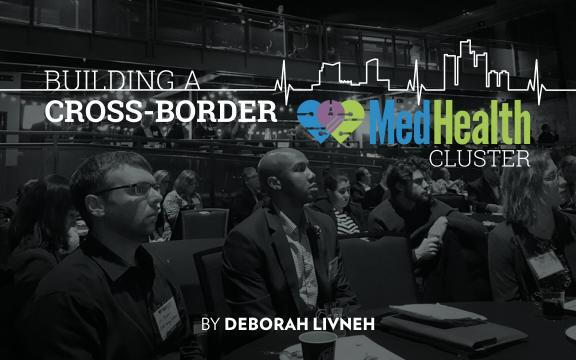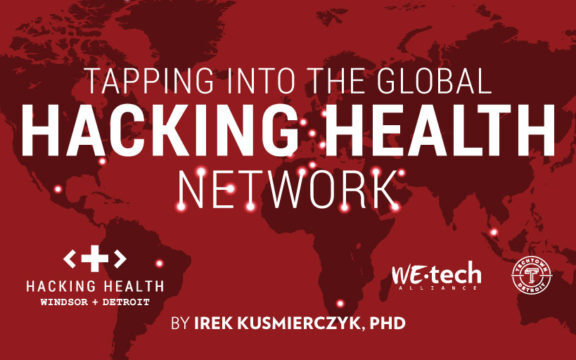Five takeaways from four medtech founders that have each raised over one million dollars for their ventures
For nearly a decade, the cross-border MedHealth initiative has been a powerful stage for Canadian founders to share their journeys, connect with healthcare leaders and investors, and build genuine relationships that drive healthcare innovation across Michigan and Ontario.
MedHealth emerged from Hacking Health Windsor-Detroit, co-led by WEtech Alliance and TechTown Detroit starting in 2015, when healthcare stakeholders in Southeast Michigan and Southwest Ontario teamed up to discuss gaps in the region’s medical ecosystem. This group of entrepreneurial service organizations, research institutions, businesses, economic development agencies, and healthcare providers quickly identified the opportunity to work together to leverage the region’s combined assets to encourage growth.
While the Windsor-Detroit region is known for its automotive ties, healthcare has long been just as interconnected. In 2025, nearly 2,000 healthcare professionals from Windsor-Essex cross into Detroit every day to work in hospitals and clinics, a steady flow of talent that speaks to the depth of bi-national integration in this space. For many in the sector, it’s felt like there’s no border at all. That same openness exists for patients, too. Canadians routinely access advanced care across the river, with institutions like Henry Ford Health System acting as a seamless extension of the healthcare landscape for specialized treatments and urgent care alike.
At this year’s MedHealth Summit, a standout panel featured four incredible founders who have each raised over a million dollars for their ventures. The conversation was candid, thoughtful, and a needed dose of real talk about what it takes to build something that lasts in healthcare.

Meet the Founders
Crystal Brown, CEO of CircNova — Raised $3.3M
Crystal leads CircNova, a health tech company focused on applying AI to RNA drug discovery and therapeutics. circnova.com
Emile Maamary, Co-founder and CMO of Steadiwear — Raised $3.5M
Emil and his team developed Steadiwear, a battery-free stabilizing glove for individuals with Parkinson’s and Essential Tremors. A WEtech Alliance-supported i.d.e.a. Fund participant, Emil is deeply committed to combining elegant engineering with user-led design. steadiwear.com
Lisa McLaughlin, Co-founder and former CEO of Workit Health — Raised $140M
Lisa led Workit Health to become a national leader in digital addiction care, combining telemedicine, therapy, and technology to serve tens of thousands of patients across the U.S. workithealth.com
Niles Heron, Co-founder and former Chief Comms & Culture Officer of Loaded — Raised $20M.
Niles helped to build Loaded Inc., a gaming management and advisory firm that works with content creators, including streamers like Myth and DrLupo, into a leader in its category. He now serves as Senior Director, Tech-based Entrepreneurship at TechTown Detroit. loaded.gg
Five Takeaways Every Healthcare Founder Should Consider
1. Your startup might feel like your baby–it isn’t. But it is an organism that grows and matures.
Moderator Niles Heron, a founder and TechTown Detroit Advisor, opened this reflection by reminding founders how deeply personal the startup journey can become, but also how important it is to remember that companies aren’t people. Lisa picked up this thread and spoke openly about what it meant to exit Workit Health after building it from the ground up. Founders pour themselves into these ventures, and that emotional investment is often what drives great products forward, but it also makes every pivot and setback feel personal. Learning to hold that tension is essential for longevity in the role.
2. The playing field isn’t even. Build accordingly.
Crystal and Lisa spoke plainly about the challenges they faced as women founders and, in Crystal’s case, as a Black woman founder. More proof is required. More traction. More readiness. More confidence. Crystal emphasized the importance of partnership over patronage: if you’re investing, you’re in it with her and you’re a partner, but that doesn’t mean you want your investors in the weeds, it means you need to prove that you have what it takes to handle the weeds no matter how unruly they may grow.
3. Validation doesn’t always come from investors; it starts with the people you’re building for.
All of the founders on stage built businesses with very personal ties to the challenges they wanted to solve. If you are your target customer persona, your process for building can be more intuitive, but customer discovery can’t stop at the founder. Emil emphasized the importance of patient feedback and clinical champions. Steadiwear’s dedication to interviewing thousands of patients and hundreds of clinicians spoke volumes before their sales or production numbers could. Before major investors said yes, Steadiwear won pitch competitions and had patients advocating for the product. Those voices opened doors and made the tech real to decision-makers.
4. You need a team that can execute, not just a vision that excites.
Crystal brought this home clearly. Her deck might open with vision, but it ends with team. Team was, in her opinion, the true “closer” of her early pitch decks, because vision without execution isn’t enough, and in healthcare, credibility starts with who’s in the room with you.
5. Every “no” is data. Use it.
Rejection is part of the path, and all of the founders on stage discussed using that feedback like a research loop. Crystal said she takes this one step further by following up with investors to ask for a sit-down conversation about why they passed. Then she writes it down, looks for patterns, and improves the approach. The founders all noted that not every piece of feedback is something to act on, instead they take the time to look for throughlines and sharpen their approach based on responding to trends, not outliers.

These founders brought honesty, grit, and clarity to a conversation that’s too often flattened into headlines and pitch decks. Their stories offered something that founders rarely get in public spaces: permission to tell the truth about what building a company really costs, and what it can offer in return. For Emil, who WEtech has had the privilege of directly supporting, watching Steadiwear’s evolution has been a reminder that specifically in healthcare, careful and patient innovation go a long way in helping new products break through.
There’s something powerful about hearing from people who’ve raised both funding, and the bar, for entrepreneurial success by refusing to lose themselves in the process. That’s what made this panel stand out.

Adam Castle
Director of Venture Services & Partnerships,
WEtech Alliance













